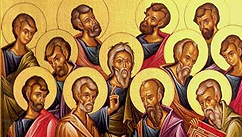|
The word Apostle (apostolos) designates a person with a particular mission. In the very strict biblical meaning it denotes only the twelve Apostles. In the Gospel narratives the Twelve Apostles are described as having been commisioned to preach the Gospel to the world, regardless of whether Jew or Gentile. Although the Apostles are portrayed as having been Galilean Jews, and 10 of their names are Aramaic and the rest are Greek. The Church considers St Paul in the same status because of his direct experience with Jesus Christ and zeal for the propagation of the Gospel. According to the tradition, all the Apostles, except St John, are suffered martyrdom.
-
The Twelve Apostles
According to the list occurring in the Synoptic Gospels (Mk 3:13-19, Mt. 10:1-4, Lk.6:12-16), the Twelve chosen by Jesus near the beginning of his ministry, those whom also He named Apostles, were:
-
Simon: called Peter (Grk. petros, petra; Aram. kēf; Engl. rock) by Jesus, also known as Simon bar Jonah and Simon bar Jochanan (Aram.)
-
Andrew: brother of Peter, a Bethsaida fisherman and disciple of John the Baptist, and also the First-Called Apostle.
-
James and
-
John: sons of Zebedee, called by Jesus Boanerges (an Aramaic name explained in Mk 3:17 as “Sons of Thunder”).
-
Philip: from Bethsaida “of Galilee” (John 1:44, 12:21)
-
Bartholomew: in Aramaic “bar-Talemai”, “son of Talemai” or from Ptolemais, sometimes identified with the Nathanael of John 1:45-1:51.
-
Thomas: also known as Judas Thomas Didymus – Aramaic T’oma’ = twin, and Greek Didymous = twin.
-
James, son of Alphaeus: commonly identified with James the Less. Sometimes also identified with James the Just.
-
Matthew: the tax collector, some identify with Levi son of Alphaeus
-
Simon the Canaanite: called in Luke and Acts “Simon the Zealot”, some identify with Simeon of Jerusalem, which others dispute on the grounds that Simeon was described at the time of Jesus’ birth some thirty years before, as an old man not far from death.
-
Judas scariot: the name Iscariot may refer to the Judaean towns of Kerioth or to the sicarii (Jewish nationalist insurrectionists), or to Issachar. Also referred to (e.g. at Jn. 6:71 and 13:26) as “Judas, the son of Simon”. He was replaced as an apostle in Acts by Matthias.
-
The identity of the other apostle of the twelve, traditionally called St. Jude, varies between the Synoptic Gospels and also between ancient manuscripts of each gospel: Mark names him as Thaddaeus; Different manuscripts of Matthew identify him as either Thaddeus or Lebbaeus.
|


